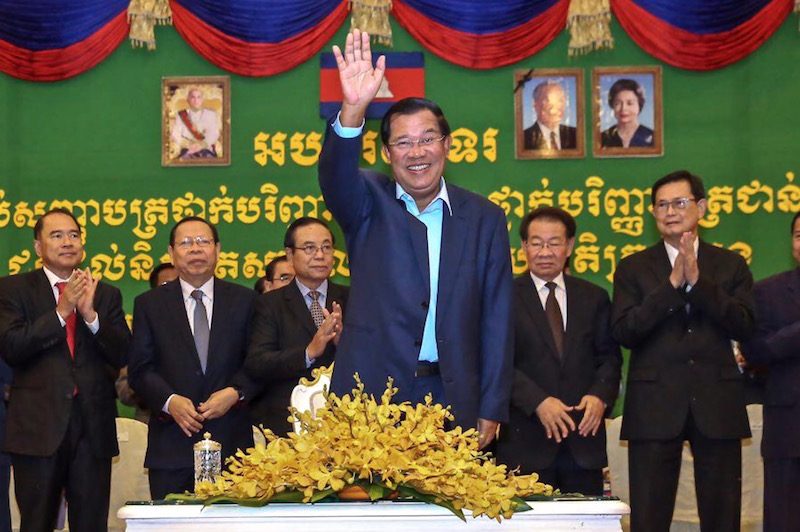Prime Minister Hun Sen vowed sweeping changes to Cambodia’s law governing political parties in a move that could eliminate the CNRP and remove opposition leader Sam Rainsy or any other politician convicted by Cambodia’s courts—from a leadership position.
The new rules would bar convicts from holding leadership positions, limit the influence of foreign financing and even dissolve parties whose members acted illegally, he said.

“Our law is really lax,” Mr. Hun Sen told more than 5,000 students at a graduation ceremony in Phnom Penh on Thursday, saying CPP lawmakers and lawyers had begun drafting the overhaul on Wednesday and would seek quick approval from the National Assembly.
“It’s ridiculous to allow convicts to remain party leaders,” Mr. Hun Sen said in a pointed reference to exiled CNRP leader Sam Rainsy, who faces a raft of criminal charges he says are politically motivated, including a $1 million defamation suit filed by Mr. Hun Sen.
Thailand’s military-backed Constitution offered a good benchmark for Cambodia, the prime minister told the crowd.
“I think that we should follow Thailand, which means anyone committing serious mistakes would cause their party to be dissolved,” he said.
The Thai military has ruled the country on and off for the past decade and the current junta has repeatedly delayed a promised election. Former Prime Minister Thaksin Shinawatra as well as his successor, Samak Sundaravej, were pushed aside—and, in Mr. Thaksin’s case, exiled—and had their parties dissolved after running afoul of the military and its supporters.
“The People’s Power Party was dissolved just because Samak Sundaravej appeared as a chef on television,” Mr. Hun Sen said, referring to a side gig that Thai courts deemed a conflict of interest. “He then lost his position as prime minister and they also dissolved his party.”
“So we follow it,” Mr. Hun Sen said of the Thai example, saying he sought to “dissolve parties and then ban the political rights for not just a few leaders, but all the party’s board of directors.”
“This is it and I’m not telling a joke—we’re really going to do it,” he said.
Mr. Rainsy went into exile in November 2015 to avoid a two-year prison sentence for defaming Deputy Prime Minister Hor Namhong. His deputy, Kem Sokha, was pardoned late last year of his own conviction related to a “prostitution” case also widely seen as being a political attack by the courts.
CNRP lawmaker Mu Sochua said the proposed law amounted to a challenge not just to her party, but to Cambodian democracy.
“Anybody could be the target,” she said. “Who is going to lose? The people as a whole.”
Ms. Sochua offered no specifics on how the party would fight the proposal, saying that its focus continued to be on upcoming commune and next year’s national elections.
It would not be the first time in the past two months that the prime minister has appeared to take a page from his neighbor’s playbook.
The government has aggressively pursued suspects accused of photoshopping King Norodom Sihamoni’s face into a gay pornographic scene, in a move reminiscent of Thailand’s much stricter lese majeste laws.
Phil Robertson, deputy Asia director for Human Rights Watch, slammed Mr. Hun Sen’s proposals as the latest proof that authoritarian ideas “spread like the flu among ASEAN leaders.”
“The so-called ‘bad apple’ principle of holding the entire political party responsible for the acts of any one board member was ultimately discarded in Thailand as totally unjust and impractical, but I don’t suppose a dictator like Hun Sen would care about that,” he wrote in an email on Thursday.
Sophal Ear, author of “Aid Dependence in Cambodia: How Foreign Assistance Undermines Democracy,” said that as U.S. President Donald Trump cast aside past American sermonizing on democracy and human rights, Mr. Hun Sen would take full advantage of the situation.
“There is definitely learning going on,” he wrote in an email. “Just as good ideas spread, so do bad ones.”




